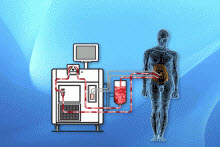Testimonials of Patients Treated at Stony Brook Medicine
Stony Brook University Hospital is the only hospital on Long Island to provide cytoreductive surgery (CRS) and HIPEC — heated intra-peritoneal chemotherapy — for the treatment of advanced colon cancer, appendiceal cancer, gastric cancer, and other late-stage abdominal cancers.
In select patients, HIPEC may increase survival time significantly. It offers patients hope when hope is needed most. Our surgeons are the most experienced in the United States, having performed CRS and HIPEC since the 1990s with zero mortality.
The CRS-HIPEC procedure is an aggressive combination of surgery and chemotherapy to eliminate abdominal tumors. The goal of CRS and HIPEC is to perform radical surgery to remove all disease, but also to enable return to regular daily activities.
CRS is performed to remove all sites of gross disease, and HIPEC, which is also performed in the operating room, is designed to kill microscopic cells that may remain after CRS.
The heat improves drug absorption and treatment effect with minimal exposure to the rest of the body. By putting chemotherapy directly into the abdomen, the drug comes into direct contact with the tumor cells.
| Online consultation service: Our CRS-HIPEC team leader Dr. Georgios V. Georgakis is available to review radiographic imaging and discuss treatment options. Interested physicians and patients should call the Surgical Oncology Division at 631-444-8086. |
How: HIPEC involves the use of conventional chemotherapy drugs heated to a high temperature that helps to kill cancer cells. By bathing the abdomen with heated chemotherapy immediately following surgery, a higher dose of medication can be used than would normally be tolerated intravenously.
Where: The procedure is done in the operating room under general anesthesia. A thorough exploration is done followed by the removal of all visible tumor. This is followed by the perfusion of heated chemotherapy for 30-90 minutes. The entire procedure takes anywhere from 4-12 hours, depending on how much disease the person has. At Stony Brook, a surgical oncologist and a medical oncologist are both in the operating room for the procedure.
Hospitalization: About 1 week in the hospital is required.
Benefits: Patients with carcinomatosis from these cancers may gain additional years of survival with this treatment, with good quality of life. While newer systemic chemotherapy agents have improved survival for patients with colon cancer, tumors with this pattern of spread often don’t respond to systemic chemotherapy. Patients with appendiceal carcinoma or mesothelioma have a 5-year survival rate of as high as 60% with CRS and HIPEC.
Experience: Our experience using CRS and HIPEC for all of these cancers is among the largest in the world.
Q: What are the benefits of HIPEC?
A: HIPEC allows for higher concentrations of chemotherapy to be delivered into the abdomen and may be more effective than standard intravenous chemotherapy for some tumors.
HIPEC is the type of treatment that's best at killing microscopic cancer cells (too small to be seen with the naked eye).
HIPEC in combination with surgery may be more beneficial than standard chemotherapy alone.
Q: Who is a candidate for HIPEC?
A: A thorough evaluation is required by our team of experts to determine if a patient is a good candidate for HIPEC. In addition to the presence of stage 4 abdominal cancer, other factors are considered, including the presence of other existing medical conditions, the type and location of the cancer, the surgical history of the patient, and the patient's overall strength.
Q: What conditions are treatable with HIPEC?
A: The listed conditions have been found to respond favorably to treatment with HIPEC:
- Appendiceal cancer
- Colon cancer with spread to the peritoneum
- Gastric cancer with spread to the peritoneum
- Mesothelioma
- Ovarian cancer with spread to the peritoneum
- Primary peritoneal cancer
- Pseudomyxoma peritonei
The Appendix Cancer Connection, a non-profit organization devoted to helping patients with appendix cancer and peritoneal surface malignancies, provides information about CRS and HIPEC. PMP Pals an additional patient resource for HIPEC.

